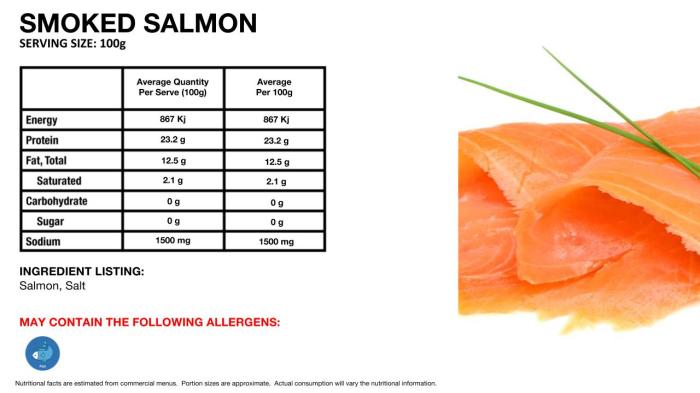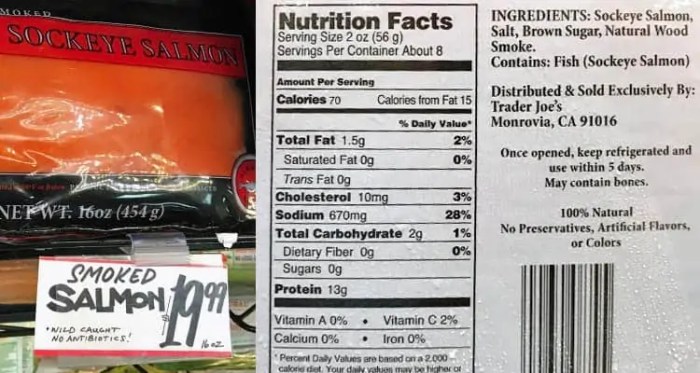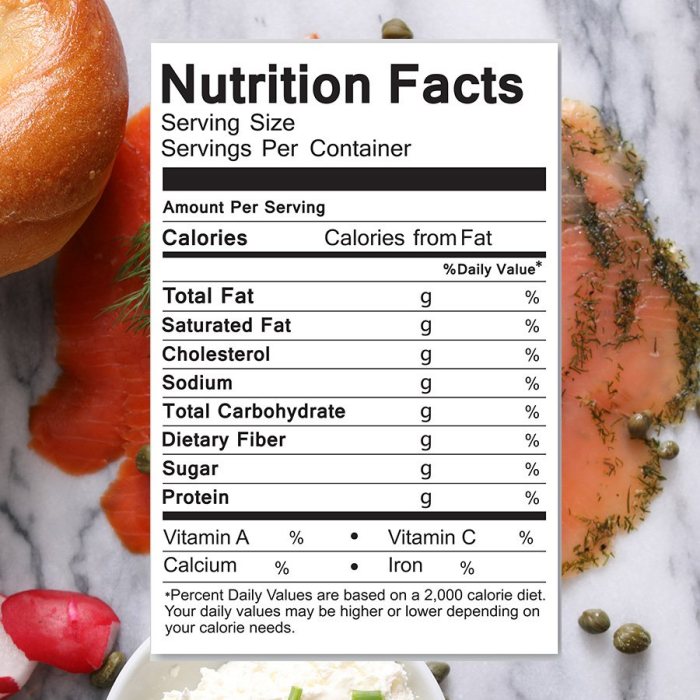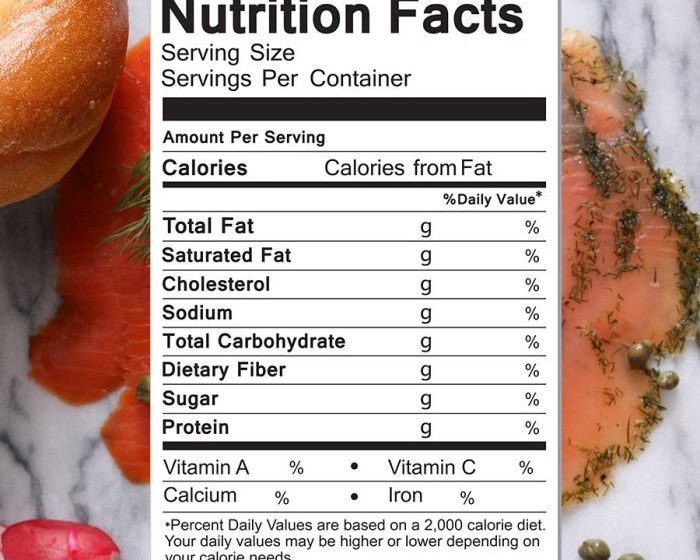Nutritional Composition of Smoked Salmon
Smoked salmon nutrition facts – Smoked salmon offers a delicious and nutritious addition to any diet. Its rich flavor profile often overshadows its significant nutritional value, which includes a wealth of protein, healthy fats, and essential vitamins and minerals. Understanding the detailed nutritional composition allows for informed dietary choices and helps appreciate the health benefits associated with consuming this popular fish.
Macronutrient Breakdown in Smoked Salmon
The macronutrient profile of smoked salmon varies slightly depending on the type of salmon and preparation method. However, a general guideline for a typical 3-ounce (85-gram) serving provides a good overview. This serving size is commonly used for nutritional comparisons and represents a reasonable portion for a meal.
| Serving Size | Protein (grams) | Fat (grams) | Carbohydrates (grams) |
|---|---|---|---|
| 3 ounces (85 grams) | 20-25 | 10-15 | 0-1 |
Note that these values are approximate and can vary slightly depending on the specific type of salmon and processing methods.
Types of Fat and Their Health Benefits
Smoked salmon is a particularly good source of healthy fats, primarily omega-3 fatty acids. These polyunsaturated fats are crucial for maintaining overall health. The predominant omega-3s in salmon are EPA (eicosapentaenoic acid) and DHA (docosahexaenoic acid).These omega-3s are associated with numerous health benefits, including:* Reduced risk of heart disease: Omega-3s help lower triglycerides, blood pressure, and inflammation, all contributing factors to heart disease.
Improved brain function
DHA is a critical structural component of the brain and is essential for cognitive function and development.
Reduced inflammation
Omega-3s have potent anti-inflammatory properties, beneficial for various conditions.
Improved eye health
DHA plays a vital role in maintaining the health of the retina and preventing age-related macular degeneration.
Vitamin and Mineral Content, Smoked salmon nutrition facts
Smoked salmon is also an excellent source of several essential vitamins and minerals. These nutrients contribute to various bodily functions and overall well-being. A 3-ounce serving typically provides:
- Significant amounts of Vitamin D: Crucial for calcium absorption and bone health.
- High levels of Vitamin B12: Essential for nerve function and red blood cell formation.
- Substantial amounts of Selenium: A powerful antioxidant that protects cells from damage.
- Good source of Potassium: Important for maintaining fluid balance and blood pressure regulation.
Smoked Salmon and Heart Health

Smoked salmon, a culinary delight, also offers potential benefits for cardiovascular health. Its nutritional profile, particularly its rich omega-3 fatty acid content and various micronutrients, contributes to this positive association. Understanding the interplay between these components and heart health is crucial in appreciating the overall health impact of incorporating smoked salmon into a balanced diet.Omega-3 Fatty Acids and Cardiovascular Disease Risk ReductionOmega-3 fatty acids, specifically eicosapentaenoic acid (EPA) and docosahexaenoic acid (DHA), are polyunsaturated fats with established roles in reducing the risk of cardiovascular disease.
These fatty acids work through various mechanisms, including reducing triglyceride levels, lowering blood pressure, decreasing the risk of blood clot formation, and potentially reducing inflammation – all significant factors in the development of heart disease. Studies have shown a correlation between higher intakes of omega-3 fatty acids and a decreased incidence of heart attacks, strokes, and other cardiovascular events.
Omega-3 Content Comparison Across Fish
The omega-3 content varies considerably across different types of fish. Smoked salmon is a good source, but other fish may offer even higher levels. The following table provides a comparison, though it’s important to note that the exact values can fluctuate depending on factors such as the fish’s diet and the method of preparation.
| Fish Type | Omega-3 (mg/100g) | Omega-6 (mg/100g) | Omega-3/Omega-6 Ratio |
|---|---|---|---|
| Smoked Salmon | 1000-2000 | 100-200 | 5-20 |
| Sardines | 1500-2500 | 150-250 | 6-17 |
| Mackerel | 1200-2200 | 100-200 | 6-22 |
| Tuna (Albacore) | 600-1200 | 50-150 | 4-12 |
Note: These values are approximate and can vary depending on the specific species, size, and preparation method of the fish. It is advisable to consult more detailed nutritional databases for precise information.
Sodium Content and Heart Health
While smoked salmon offers heart-healthy benefits, its relatively high sodium content presents a potential concern. Excessive sodium intake is linked to increased blood pressure, a major risk factor for cardiovascular disease. The smoking process often involves adding salt, significantly increasing the sodium content compared to fresh salmon. To mitigate this risk, individuals should consume smoked salmon in moderation and be mindful of their overall sodium intake throughout the day.
Choosing lower-sodium varieties or rinsing the salmon before consumption can help reduce sodium levels. A balanced diet that emphasizes whole foods, fruits, and vegetables, while limiting processed foods and excessive salt, remains essential for maintaining optimal heart health.
Smoked Salmon and Other Health Aspects: Smoked Salmon Nutrition Facts

Beyond its contribution to heart health, smoked salmon offers a range of other potential health benefits stemming from its rich nutritional profile. These advantages extend to brain function, eye health, and muscle development, highlighting its versatility as a nutritious food source.Smoked salmon’s benefits are multifaceted and contribute to overall well-being. The following sections delve into the specific ways this delicious fish can support various aspects of health.
Smoked Salmon and Brain Health
The omega-3 fatty acids, particularly DHA and EPA, found abundantly in smoked salmon, are crucial for optimal brain function. These fatty acids are integral components of brain cell membranes, influencing their fluidity and signaling capabilities. Studies suggest that adequate intake of omega-3s may help improve cognitive function, memory, and reduce the risk of age-related cognitive decline, such as Alzheimer’s disease.
For instance, research has shown a correlation between higher omega-3 consumption and improved performance on cognitive tests in older adults. The vitamin D content in smoked salmon also plays a role, as it’s linked to better cognitive performance and reduced risk of dementia.
Smoked Salmon and Eye Health
Smoked salmon’s high concentration of omega-3 fatty acids also plays a significant role in maintaining eye health. These fatty acids are essential components of the retina and help protect against age-related macular degeneration (AMD), a leading cause of vision loss. Furthermore, the presence of astaxanthin, a carotenoid pigment responsible for the salmon’s pink color, possesses potent antioxidant properties that can safeguard the eyes from oxidative stress and damage.
This antioxidant action contributes to preventing various eye diseases. The vitamin D present in smoked salmon further supports eye health by potentially reducing the risk of cataracts.
Smoked Salmon and Protein Content
Smoked salmon is an excellent source of high-quality protein, crucial for muscle growth and repair. Protein provides the building blocks – amino acids – necessary for synthesizing new muscle tissue and repairing damaged muscle fibers after exercise. The protein in smoked salmon is easily digestible and contains all the essential amino acids, making it a complete protein source.
Adequate protein intake is especially important for athletes, older adults experiencing age-related muscle loss (sarcopenia), and individuals recovering from injury or illness. Consuming smoked salmon as part of a balanced diet can contribute significantly to maintaining muscle mass and strength throughout life. For example, a 100g serving of smoked salmon can provide approximately 20-25g of protein, a substantial contribution to daily protein needs.
Smoked salmon offers a good source of protein and omega-3 fatty acids, contributing to a balanced diet. However, it’s also important to consider the sodium content. For a contrasting nutritional profile, you might compare it to the crisp sweetness and fiber found in fruits like apples; check out this resource for details on granny smith apple nutrition facts to see the differences.
Ultimately, a varied diet incorporating both smoked salmon and fruits like Granny Smith apples provides a wider range of nutrients.
Smoked Salmon in a Balanced Diet

Incorporating smoked salmon into a balanced diet offers a delicious and nutritious way to boost your intake of essential nutrients. Its rich omega-3 fatty acid content, alongside protein and vitamins, contributes significantly to overall health and well-being. However, mindful consumption is key to maximizing benefits and mitigating potential drawbacks like high sodium content. This section explores practical strategies for integrating smoked salmon into a healthy eating plan.
Sample Meal Plan Incorporating Smoked Salmon
A well-planned diet ensures adequate nutrient intake. The following sample meal plan demonstrates how smoked salmon can be easily integrated into a balanced daily food regimen, providing a variety of essential nutrients. Portion sizes should be adjusted to meet individual caloric needs.
- Breakfast: Smoked salmon and avocado toast on whole-wheat bread. A small side of berries provides antioxidants.
- Lunch: Smoked salmon salad sandwich on whole-grain bread with mixed greens, tomatoes, and a light vinaigrette. A side of baby carrots offers added fiber.
- Dinner: Baked salmon with roasted vegetables (broccoli, asparagus, bell peppers). A small portion of quinoa adds complex carbohydrates.
- Snacks: A handful of almonds and a small piece of smoked salmon.
Visual Descriptions of Smoked Salmon Recipes
The visual appeal of food enhances the dining experience. These descriptions illustrate how smoked salmon can be presented in diverse and nutritionally balanced meals.
- Smoked Salmon & Cucumber Bites: Imagine small, delicate cucumber rounds topped with a thin layer of creamy smoked salmon. A sprinkle of fresh dill adds a vibrant green contrast to the salmon’s rich orange hue. The texture is a delightful combination of the crisp cucumber and the silky, slightly salty salmon.
- Smoked Salmon Pasta Salad: Picture a vibrant pasta salad featuring rotini pasta tossed with a lemon-dill vinaigrette. Flakes of smoked salmon are scattered throughout, adding pops of bright orange against the green herbs and yellow pasta. The textures are varied, with the al dente pasta contrasting with the soft salmon and the fresh herbs.
- Smoked Salmon & Avocado Omelette: Visualize a fluffy omelette, its golden-yellow interior speckled with flecks of bright green avocado and the rich orange of smoked salmon. The colors are warm and inviting, and the textures contrast beautifully: the soft omelette, the creamy avocado, and the firm salmon.
Incorporating Smoked Salmon into a Balanced Diet
To maximize the health benefits and minimize potential drawbacks, consider these guidelines when incorporating smoked salmon into your diet. Choose low-sodium varieties whenever possible, and balance its consumption with other nutrient-rich foods. Remember that moderation is key, especially due to its sodium content. Pairing smoked salmon with foods rich in potassium, such as bananas or spinach, can help offset the sodium intake.
Including a variety of fruits, vegetables, and whole grains in your diet ensures a balanced nutritional profile.
Answers to Common Questions
Is smoked salmon high in cholesterol?
Smoked salmon is relatively low in cholesterol, making it a suitable choice for individuals watching their cholesterol intake. However, focus on portion control.
Can pregnant women eat smoked salmon?
Pregnant women should choose only high-quality, commercially smoked salmon to minimize the risk of listeria. Avoid home-smoked varieties.
How long can I store smoked salmon in the refrigerator?
Properly stored smoked salmon typically lasts for 3-5 days in the refrigerator. Always check for any signs of spoilage before consumption.
Are there any allergies associated with smoked salmon?
Yes, some individuals are allergic to fish, including salmon. Those with known fish allergies should avoid consuming smoked salmon.
What are some creative ways to use smoked salmon beyond bagels?
Smoked salmon can be incorporated into salads, pasta dishes, quiches, or used as a topping for avocado toast or roasted vegetables. Its versatility makes it a great addition to many recipes.

